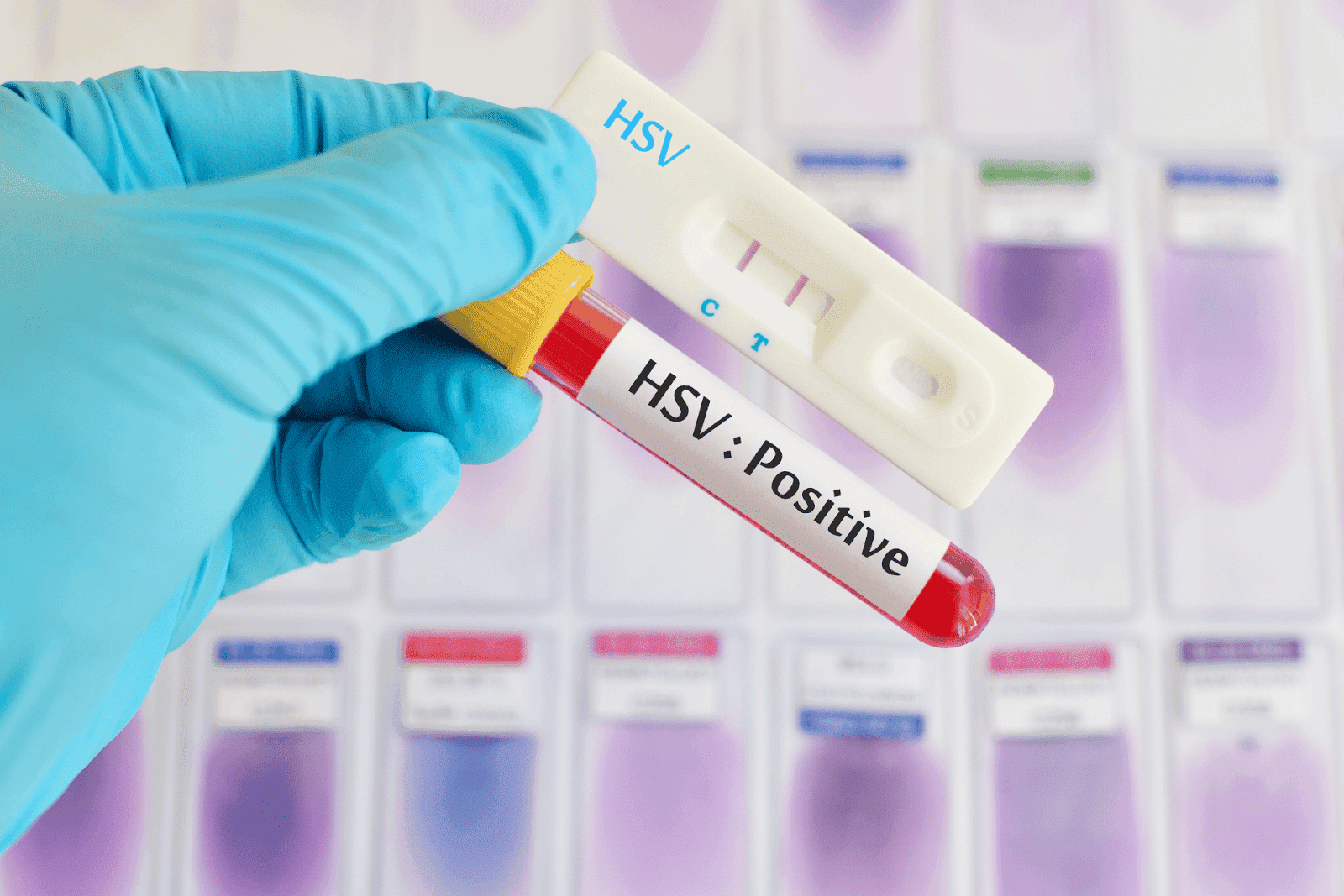Tailbone Pain: Causes and Treatment
Why Tailbone Pain HappensThat sharp ache when you sit down. The lingering discomfort makes driving unbearable. Tailbone pain disrupts daily life in ways most people never [...]
Read More
Medically reviewed by Oghenefejiro Okifo | MD, Harvard Medical School | Henry Ford Hospital - Detroit, MI on October 12th, 2025.
Contact dermatitis from soaps, detergents, or latex creates red, itchy patches that lack the characteristic fluid-filled blisters of HSV outbreaks.
Syphilis chancres appear as single, painless, firm ulcers with clean edges, contrasting with herpes' multiple painful blisters that cluster together.
Molluscum contagiosum produces small, flesh-colored bumps with distinctive central dimples and can persist for 6-12 months without treatment.
PCR testing provides 95-99% accuracy for active lesions within 48 hours of appearance, while older viral cultures take 3-7 days and miss 25% of cases.
Folliculitis affects individual hair follicles and responds to warm compresses within days, unlike herpes which follows a predictable 7-10 day healing cycle.
Genital herpes is a common sexually transmitted infection caused by the herpes simplex virus (HSV). Its symptoms, which often include painful sores and blisters in the genital area, can be distressing and alarming. However, several other conditions can mimic genital herpes, leading to confusion and misdiagnosis. Understanding these look-alike conditions is essential for accurate diagnosis and appropriate treatment.
Before exploring what can be mistaken for genital herpes, it’s important to understand the typical presentation of the infection. Genital herpes usually causes clusters of small, painful blisters or sores on or around the genitals, anus, or thighs. These sores eventually rupture, leaving ulcers that can take several weeks to heal. The initial outbreak can be particularly severe, with symptoms manifesting within a few days after exposure to the virus, often accompanied by a burning sensation or itching in the affected areas.
Other symptoms may include itching, burning sensations, pain during urination, and flu-like symptoms such as fever and swollen lymph nodes. However, not everyone infected with HSV experiences noticeable symptoms, which can complicate diagnosis. In fact, many individuals may carry the virus asymptomatically, unknowingly transmitting it to partners. This asymptomatic shedding can occur even when there are no visible sores, making awareness and education about the virus crucial for prevention.
Because of the similarity in symptoms with other conditions, laboratory testing is often necessary to confirm genital herpes. This includes viral cultures, polymerase chain reaction (PCR) tests, or blood tests for HSV antibodies. It is essential for individuals who suspect they may have been exposed to the virus or are experiencing symptoms to seek medical advice promptly. Early diagnosis can lead to better management of the condition and reduce the risk of transmission to others. Additionally, understanding the nuances of the diagnosis can help individuals distinguish between genital herpes and other sexually transmitted infections (STIs) that may present with similar symptoms, such as syphilis or chancroid.
Furthermore, the psychological impact of a genital herpes diagnosis should not be overlooked. Many individuals experience feelings of shame, anxiety, or depression upon learning they have the virus. Support groups and counseling can be beneficial in helping individuals cope with their diagnosis and navigate the complexities of relationships and sexual health. Education about the virus, its transmission, and management options can empower those affected, allowing them to lead healthy, fulfilling lives while minimizing the risk to their partners.
 Common Conditions That Can Be Mistaken for Genital Herpes
Common Conditions That Can Be Mistaken for Genital HerpesContact dermatitis is an inflammation of the skin caused by exposure to irritants or allergens. It can cause redness, itching, and blister-like eruptions in the genital area, resembling herpes sores. Common irritants include soaps, detergents, latex condoms, and personal hygiene products.
Unlike herpes, contact dermatitis usually does not cause painful ulcers or systemic symptoms like fever. Treatment involves identifying and avoiding the irritant, along with topical corticosteroids to reduce inflammation. In some cases, individuals may benefit from over-the-counter antihistamines to alleviate itching, and cool compresses can provide soothing relief. It's essential to monitor the skin for any signs of secondary infection, which can occur if the area becomes too irritated or scratched.
Syphilis is another sexually transmitted infection that can cause sores in the genital area. The primary stage of syphilis often presents with a single, painless ulcer called a chancre, which can be mistaken for a herpes lesion. However, syphilis sores are typically firm, round, and painless, whereas herpes sores tend to be multiple and painful.
Syphilis requires specific antibiotic treatment, so accurate diagnosis through blood tests or direct examination of the sore is critical. The infection progresses through several stages, each with distinct symptoms, including rashes and systemic manifestations. Early detection and treatment are vital, as untreated syphilis can lead to severe complications, including cardiovascular and neurological issues. Regular screening is recommended for sexually active individuals, especially those with multiple partners.
Genital yeast infections, caused by the fungus Candida, can cause itching, redness, and white discharge in the genital area. In some cases, severe yeast infections may lead to red, inflamed patches and small sores or fissures that might be confused with herpes lesions.
Unlike herpes, yeast infections do not cause blisters or ulcers and are usually accompanied by a thick, cottage cheese-like discharge. Antifungal medications are effective treatments for candidiasis. Lifestyle factors such as diet, stress, and antibiotic use can influence the likelihood of developing a yeast infection. Maintaining a balanced diet rich in probiotics and reducing sugar intake may help prevent future occurrences. Additionally, wearing breathable cotton underwear can promote a healthier environment in the genital area.
Molluscum contagiosum is a viral infection that causes small, flesh-colored, dome-shaped bumps with a central dimple. These bumps can appear on the genital area and may be mistaken for herpes blisters by those unfamiliar with the condition.
Unlike herpes sores, molluscum bumps are typically painless and do not ulcerate. The infection often resolves on its own, but can be treated by a healthcare provider if necessary. Molluscum contagiosum is spread through skin-to-skin contact, making it important to practice safe hygiene, especially in communal settings like swimming pools or gyms. In some cases, the bumps can be itchy or inflamed, prompting individuals to seek treatment for cosmetic reasons or discomfort.
Folliculitis is an inflammation of hair follicles caused by bacterial or fungal infections. It can cause red, tender bumps or pustules in the genital region, which might be confused with herpes sores.
Folliculitis usually involves hair follicles and can be accompanied by itching or mild pain. Treatment depends on the cause and may include antibacterial or antifungal medications. Maintaining proper hygiene and avoiding tight clothing can help prevent folliculitis from recurring. In some cases, individuals may need to avoid shaving or waxing the affected area until the condition resolves, as these practices can irritate the follicles further and exacerbate the inflammation.
Other viral infections, such as syphilitic chancres or even certain types of human papillomavirus (HPV) lesions, can sometimes mimic herpes symptoms. HPV can cause genital warts that may look like clusters of bumps, but are generally not painful or ulcerated like herpes sores.
It's crucial to differentiate between these infections, as HPV can lead to serious health issues, including certain cancers. Vaccination against HPV is recommended for preteens and young adults to prevent the spread of this virus. Regular check-ups and screenings can help detect any abnormalities early, ensuring timely intervention and management. Awareness of the various symptoms associated with these infections can empower individuals to seek medical advice promptly, reducing the risk of complications and transmission to partners.
Because many conditions can mimic genital herpes, self-diagnosis based on symptoms alone is unreliable and may lead to unnecessary anxiety or inappropriate treatment. Accurate diagnosis typically requires a physical examination and laboratory testing.
For those seeking fast, reliable medical advice, telehealth services offer a convenient solution. Doctronic.ai, a leader in AI-powered healthcare, provides free AI doctor visits that synthesize the latest peer-reviewed medical research to answer your health questions quickly and accurately. With over 10 million users and growing, Doctronic offers a modern approach to primary care that is faster, smarter, and more personal.
For example, if you notice sores or unusual symptoms in your genital area, you can visit Doctronic.ai to get an initial AI diagnosis in seconds. This can help you understand whether your symptoms might be herpes or another condition that requires different treatment. Additionally, Doctronic offers affordable telehealth video visits with licensed doctors 24/7 across all 50 states, providing access to expert care without leaving your home.
While telehealth can be an excellent first step, some situations require in-person evaluation. If you experience severe pain, widespread sores, difficulty urinating, or signs of systemic infection such as high fever or swollen lymph nodes, seek immediate medical attention.
Laboratory tests such as viral cultures or blood tests may be necessary to confirm the diagnosis and guide treatment. Your healthcare provider can also screen for other sexually transmitted infections that may coexist with herpes or its mimics.
 Preventing Misdiagnosis and Ensuring Proper Care
Preventing Misdiagnosis and Ensuring Proper CareMisdiagnosing genital herpes can lead to unnecessary emotional distress and inappropriate treatments. Conversely, missing a diagnosis of herpes or another STI can result in complications and ongoing transmission. To prevent these issues, consider the following tips:
Use reputable telehealth services like Doctronic.ai for initial assessments and guidance.
Seek confirmatory laboratory testing when recommended by healthcare professionals.
Be open and honest with your healthcare provider about your symptoms and sexual history.
Practice safe sex and regular STI screening to reduce risks.
Genital herpes shares symptoms with several other conditions, including contact dermatitis, syphilis, yeast infections, molluscum contagiosum, and folliculitis. Differentiating between these requires careful clinical evaluation and often laboratory testing.
Thanks to advances in telehealth, platforms like Doctronic.ai make it easier than ever to get fast, accurate, and personalized medical advice from the comfort of your home. Whether you’re concerned about genital herpes or other health issues, leveraging AI-powered tools alongside professional medical care can help you navigate your health with confidence.
If you're concerned about symptoms that resemble genital herpes or any other medical condition, Doctronic is here to provide clarity and peace of mind. Our AI-powered platform offers free, immediate doctor visits, synthesizing the latest peer-reviewed medical research to give you accurate answers and personalized care. For added convenience, our telehealth video visits connect you with licensed doctors anytime, anywhere, for less than $40. Join over 10 million users who have experienced the smarter, more personal healthcare solution. Skip the line. Talk to an AI Doctor Now, for free.
Visual diagnosis fails in up to 20% of genital lesion cases, making laboratory confirmation essential for appropriate treatment and peace of mind. Seek medical evaluation within 48 hours of symptom onset for the most accurate testing results. If you're experiencing concerning genital symptoms, Doctronic can help connect you with proper medical assessment and testing.
Why Tailbone Pain HappensThat sharp ache when you sit down. The lingering discomfort makes driving unbearable. Tailbone pain disrupts daily life in ways most people never [...]
Read MoreWhen most people think of preeclampsia, they immediately associate it with dangerously high blood pressure during pregnancy. However, a lesser-known but equally serious [...]
Read MorePanic attacks represent some of the most frightening experiences a person can endure, striking suddenly with overwhelming physical and psychological symptoms. These intense [...]
Read More